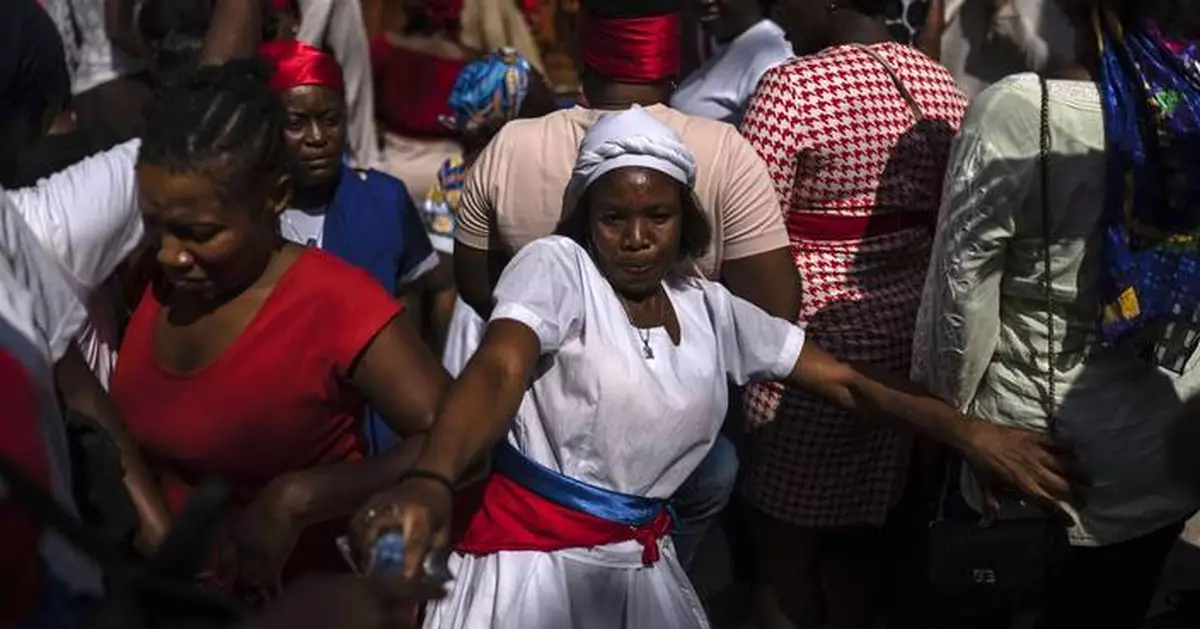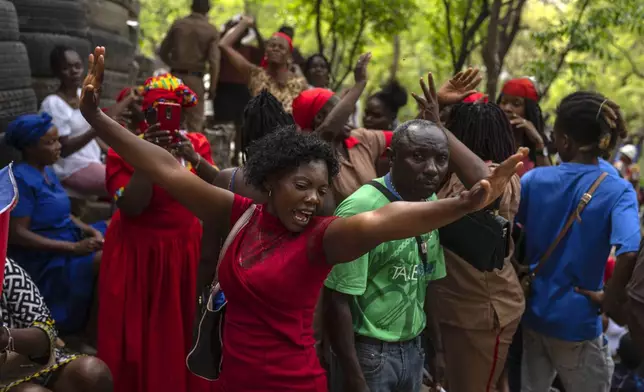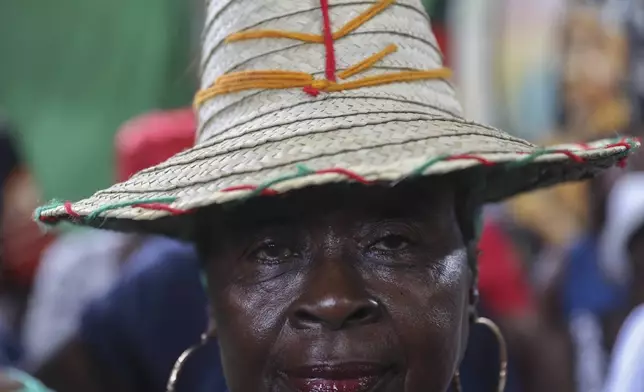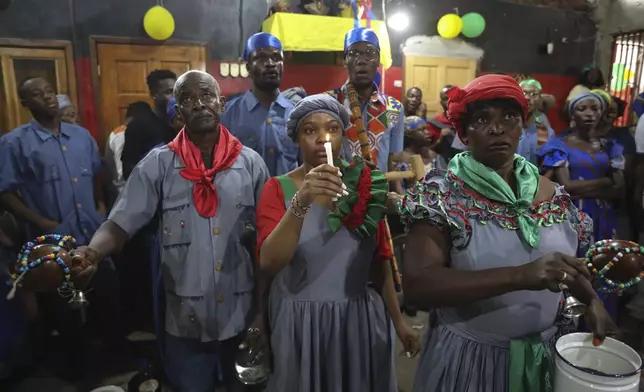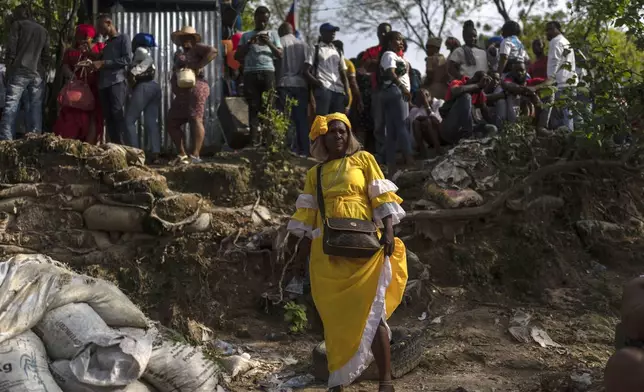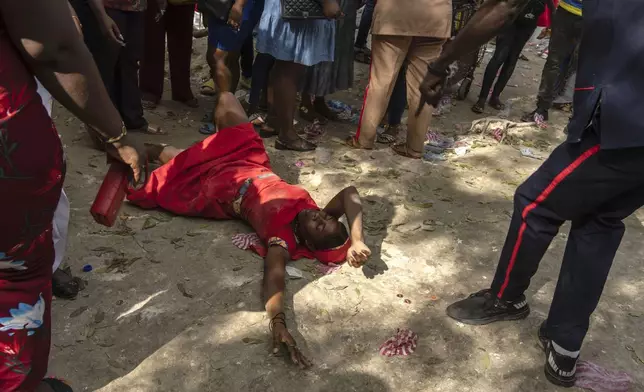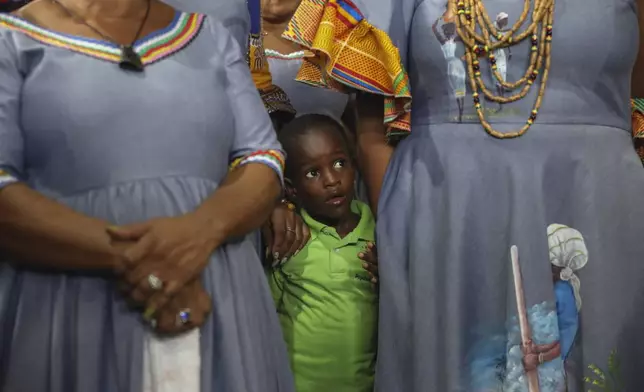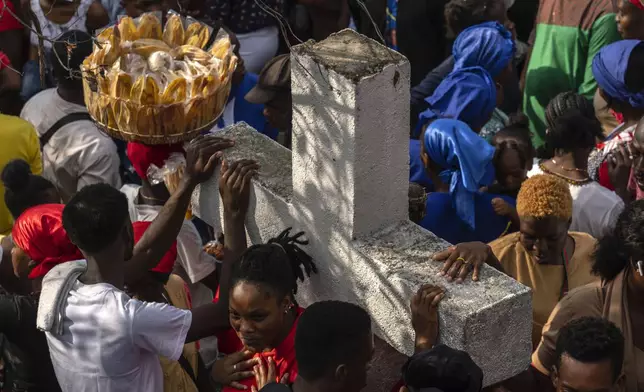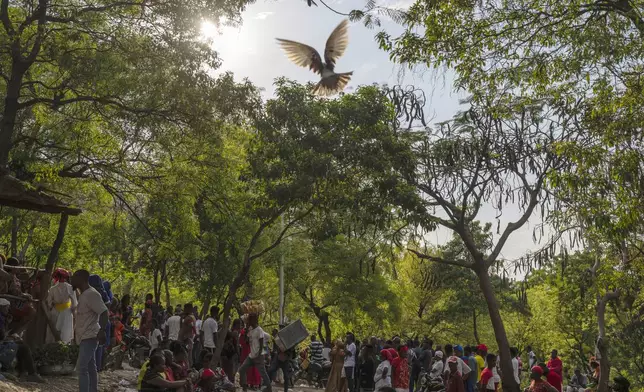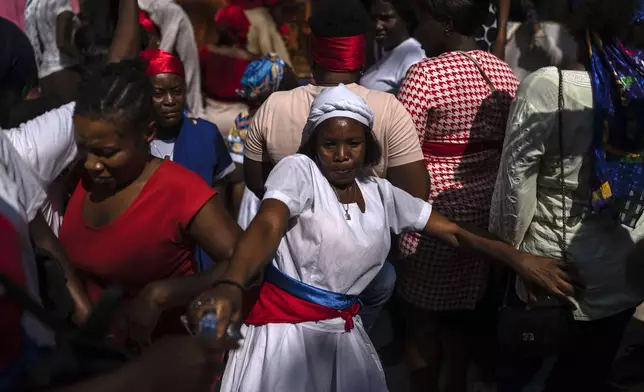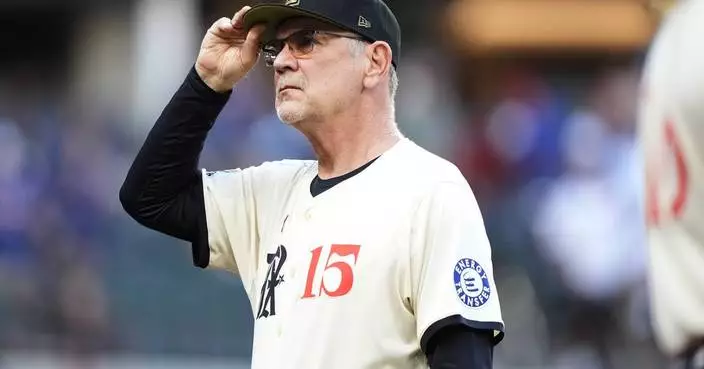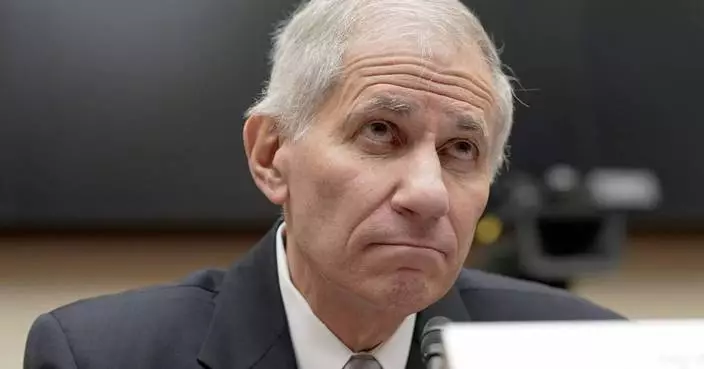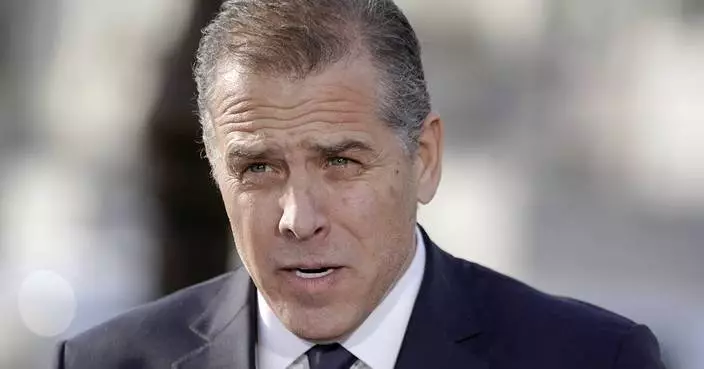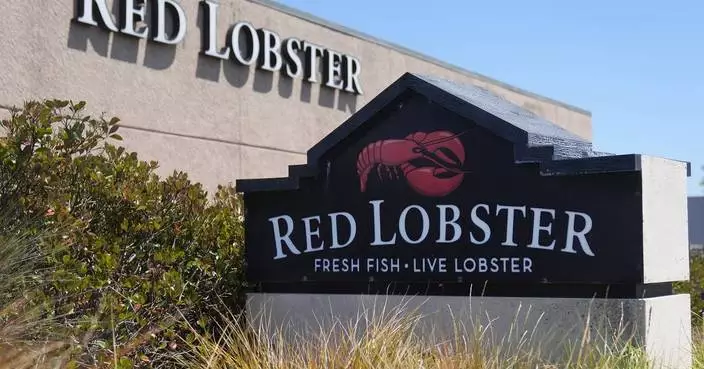PORT-AU-PRINCE, Haiti (AP) — The Vodou faithful sing, their voices rising above the gunfire erupting miles away as frantic drumbeats drown out their troubles.
They pause to swig rum out of small brown bottles, twirling in unison as they sing in Haitian Creole: “We don’t care if they hate us, because they can’t bury us.”
Click to Gallery
PORT-AU-PRINCE, Haiti (AP) — The Vodou faithful sing, their voices rising above the gunfire erupting miles away as frantic drumbeats drown out their troubles.
FILE - A vodou pilgrim attends a Mass marking the feast day of agriculture and work, in Port-au-Prince, Haiti, May 1, 2024. The syncretic religion that melds Catholicism with animist beliefs has no official leader or creeds. (AP Photo/Odelyn Joseph, File)
FILE - Vodou pilgrims attend a Mass marking the feast day of agriculture and work, in Port-au-Prince, Haiti, Wednesday, May 1, 2024. Amid the spiraling chaos, a growing number of Haitians are praying more or visiting Vodou priests known as “oungans” for urgent requests ranging from locating loved ones who were kidnapped to finding critical medication needed to keep someone alive. (AP Photo/Odelyn Joseph, File)
FILE - A Voudist clad in yellow, a color associated with the power of light, poses for a photo during the Saint George celebration in Port-au-Prince, Haiti, April 24, 2024. It’s unknown how many people currently practice Vodou in Haiti, but there’s a popular saying: “Haiti is 70% Catholic, 30% Protestant and 100% Vodou.” (AP Photo/Ramon Espinosa, File)
FILE - A Vodouist invokes a gede spirit, family of Iwa, during the Saint George celebration in Port-au-Prince, Haiti, April 24, 2024. Vodou has a single God known as “Bondye,” Creole for “Good God,” and more than 1,000 spirits known as the lwa — some that aren’t always benevolent.(AP Photo/Ramon Espinosa, File)
FILE - A child stands with Vodou pilgrims during a Mass marking the feast day of agriculture and work, in Port-au-Prince, Haiti, May 1, 2024. Vodou was at the root of the revolution that led Haiti to become the world’s first free Black republic in 1804, a religion born in West Africa and brought across the Atlantic by enslaved people. (AP Photo/Odelyn Joseph, File)
FILE - Vodou pilgrims gather round a cross during the Saint George celebration in Port-au-Prince, Haiti, April 24, 2024. Shunned publicly by politicians and intellectuals for centuries, Vodou is transforming into a more powerful and accepted religion across Haiti, where its believers were once persecuted. (AP Photo/Ramon Espinosa, File)
FILE - A dove takes flight as people attend the St. George vodou celebration in Port-au-Prince, Haiti, April 24, 2024. Hundreds of Haitians flocked to the hill for the annual celebration of St. George, a Christian martyr who was believed to be a Roman soldier and is revered by both Catholics and Vodouists. (AP Photo/Ramon Espinosa, File)
FILE - A Vodouist clad in white invokes a gede spirit during the Saint George celebration, in Port-au-Prince, Haiti, April 24, 2024. Shunned publicly by politicians and intellectuals for centuries, Vodou is transforming into a more powerful and accepted religion across Haiti, where its believers were once persecuted. (AP Photo/Ramon Espinosa, File)
Shunned publicly by politicians and intellectuals for centuries, Vodou is transforming into a more powerful and accepted religion across Haiti, where its believers were once persecuted. Increasingly, they seek solace and protection from violent gangs that have killed, raped and kidnapped thousands in recent years.
The violence has left more than 360,000 people homeless, largely shut down Haiti’s biggest seaport and closed the main international airport two months ago. Basic goods including food and life-saving medication are dwindling; nearly 2 million Haitians are on the verge of famine.
From January to March alone, more than 2,500 Haitians were killed or injured, up more than 50% from the same period last year, according to the U.N.
Amid the spiraling chaos, numerous Haitians are praying more or visiting Vodou priests known as “oungans” for urgent requests ranging from locating loved ones who were kidnapped to finding critical medication needed to keep someone alive.
“The spirits help you. They’re always around,” said Sherly Norzéus, who is initiated to become a “mambo,” or Vodou priestess.
In February, she invoked Papa Ogou, god of war and iron, when 20 armed men surrounded her car as she tried to flee the community of Bon Repos.
Her three children and the two children of her sister, who died during childbirth, sat next to her.
“We are going to burn you alive!” she recalled the gunmen yelling.
Gangs had invaded their neighborhood before dawn, setting fire to homes amid relentless gunfire.
“I prayed to Papa Ogou. He helped me get out of the situation,” Norzéus said.
When she opened her eyes, the gunmen signaled that she was free to leave.
Vodou was at the root of the revolution that led Haiti to become the world’s first free Black republic in 1804, a religion born in West Africa and brought across the Atlantic by enslaved people.
The syncretic religion that melds Catholicism with animist beliefs has no official leader or creeds. It has a single God known as “Bondye,” Creole for “Good God,” and more than 1,000 spirits known as the lwa — some that aren’t always benevolent.
During Vodou ceremonies, lwa are offered treats ranging from papayas and coffee to popcorn, lollipops and cheese puffs. A ceremony is considered successful if a Vodouist is possessed by an lwa.
Some experts consider it a religion of the exploited.
“Vodou is the system that Haitians have developed to deal with the suffering of this life, a system whose object is to minimize pain, avoid disaster, soften losses, and strengthen the survivors as much as the survival instinct,” Haitian sociologist Laënnec Hurbon wrote in a recent essay.
Vodou began to take shape in the French colony of Saint-Domingue during funeral rituals for enslaved people and dances called “calendas” that they organized on Sunday evenings. It also was practiced by slaves known as Maroons who escaped to remote mountains and were led by François Mackandal, a Vodou priest.
In August 1791, some 200 slaves gathered at night in Bois-Caiman in northern Haiti for a Vodou ceremony organized by Dutty Boukman, a renowned enslaved leader and Vodou priest. They sacrificed a pig, drank its blood and swore to keep secret an imminent revolt against slavery, according to a surgeon present at the ceremony.
After a 13-year revolution, Haiti became independent, but Vodou remained oppressed.
The country’s new leaders condemned Vodou worship, as did the Catholic Church.
Catholic leaders demanded parishioners take an oath renouncing Vodou in 1941.
Thousands of Vodou followers were lynched and hundreds of symbolic spaces destroyed in what became the most violent attack in Haiti’s history against the religion, according to journalist Herbert Nerette.
But Vodou persisted. When François Duvalier became president in 1957, he politicized the religion during his dictatorship, appointing certain oungans as its representatives, Hurbon wrote.
By 2003, Jean-Bertrand Aristide, a Salesian priest who became Haiti’s first democratically elected president, recognized Vodou as one of Haiti’s official religions.
Despite the formal recognition, Vodou remains shunned by some Haitians.
“When you say you are a Vodouist, they stigmatize you,” said Kadel Bazile, a 42-year-old civil engineer.
Until recently, Bazile was a practicing Catholic. But when he lost his job and his wife left him nearly two years ago, a friend suggested he try Vodou.
“What I find here is spirituality and fraternity. Being here is like being with family,” he said while attending a May 1 ceremony to honor Kouzen Zaka, the lwa of harvest.
He identifies the most with Erzulie Dantor, the divinity of love represented by a Black Madonna with scars on her right cheek.
“That is the spirit who lives in me,” he said. “She is going to protect me.”
As the ceremony started, Bazile smiled and moved to the beat of the drums while dancers twirled nearby, their long earrings swaying to the rhythm.
Vodou is attracting more believers given the surge in gang violence and government inaction, said Cecil Elien Isac, a 4th-generation oungan.
“Whenever the community has a big problem, they come here, because there is no justice in Haiti. You find it in the ancestral spirits,” he said.
When Isac opened his temple years ago in Port-au-Prince, about eight families in the area became members. Now he counts more than 4,000, in Haiti and abroad.
“We have a group of intellectuals who have joined,” he said. “Before, it was people who couldn’t read or write. Now it has more visibility.”
Credited with that turnaround are thinkers like Jean Price-Mars, whose 1928 book, “Thus Spoke the Uncle,” visualized Vodou as a religion, “without making the Haitian elites blush,” wrote sociologist Lewis Ampidu Clorméus.
“Until the 1920s, Haitian Vodou was generally regarded as a string of superstitions, witchcraft and ritual cannibalism,” Clorméus wrote. “Talking about Vodou constituted a shame for Haitian intellectuals.”
Vodou has since become a key ingredient in Haiti’s rich cultural scene, inspiring music, art, writing and dance.
It’s unknown how many people currently practice Vodou in Haiti, but there’s a popular saying: “Haiti is 70% Catholic, 30% Protestant and 100% Vodou.”
Vodou also has countless lwas, although Ogou Je Wouj — the god of red eyes — has grown more significant to Haitians given the lack of security in the country, said Erol Josué, a singer, oungan and director of Haiti’s National Bureau of Ethnology.
Ogou Je Wouj is a manifestation of the god of war and is believed to wield a machete.
“They want power in their body and in their mind,” Josué said of those who seek the god.
While spirits infuse believers with energy and hope, Vodou priests warn they don’t perform miracles.
“We’re praying, but we’re also taking precautions,” Isac said. “There are a lot of lwas to protect you from kidnapping, but if you walk through certain areas, no lwa is going to protect you.”
On a recent afternoon, hundreds of Haitians gathered on a steep hill and squeezed into a small church to celebrate St. George, a Christian martyr believed to be a Roman soldier revered by Catholics and Vodouists alike.
They offered him money and prayers in hopes they would make it through Haiti’s deepening crisis.
“It’s very important to be here,” said Hervé Hyppolite, a chef who practices Christianity and Vodou. “You find force, courage and also protection.”
Surrounding him was a sea of people clad in khaki and red, the saint’s colors. Some held candles as a handful of women danced nearby,
“St. George!” the priest leading the celebration yelled. The crowd shouted in response, “We need you!”
Josué, the singer and oungan, noted that some young people becoming Vodouists are trying to change traditional prayers or certain practices, but he said oungans and mambos are not embracing the push.
“We make them understand that those spirits are a symbol of resistance of the Haitian nation,” he said. “There’s a lot of substance in Vodou that can lead to a renaissance of Haiti.”
Associated Press reporter Evens Sanon contributed to this report.
Associated Press religion coverage receives support through the AP’s collaboration with The Conversation US, with funding from Lilly Endowment Inc. The AP is solely responsible for this content.

FILE - Believers dance during the St. George vodou celebration in Port-au-Prince, Haiti, Wednesday, April 24, 2024. While spirits infuse believers with energy and hope, Vodou priests warn they don’t perform miracles. (AP Photo/Ramon Espinosa, File)

FILE - A vodou pilgrim attends a Mass marking the feast day of agriculture and work, in Port-au-Prince, Haiti, May 1, 2024. The syncretic religion that melds Catholicism with animist beliefs has no official leader or creeds. (AP Photo/Odelyn Joseph, File)

FILE - Vodou pilgrims attend a Mass marking the feast day of agriculture and work, in Port-au-Prince, Haiti, Wednesday, May 1, 2024. Amid the spiraling chaos, a growing number of Haitians are praying more or visiting Vodou priests known as “oungans” for urgent requests ranging from locating loved ones who were kidnapped to finding critical medication needed to keep someone alive. (AP Photo/Odelyn Joseph, File)

FILE - A Voudist clad in yellow, a color associated with the power of light, poses for a photo during the Saint George celebration in Port-au-Prince, Haiti, April 24, 2024. It’s unknown how many people currently practice Vodou in Haiti, but there’s a popular saying: “Haiti is 70% Catholic, 30% Protestant and 100% Vodou.” (AP Photo/Ramon Espinosa, File)

FILE - A Vodouist invokes a gede spirit, family of Iwa, during the Saint George celebration in Port-au-Prince, Haiti, April 24, 2024. Vodou has a single God known as “Bondye,” Creole for “Good God,” and more than 1,000 spirits known as the lwa — some that aren’t always benevolent.(AP Photo/Ramon Espinosa, File)

FILE - A child stands with Vodou pilgrims during a Mass marking the feast day of agriculture and work, in Port-au-Prince, Haiti, May 1, 2024. Vodou was at the root of the revolution that led Haiti to become the world’s first free Black republic in 1804, a religion born in West Africa and brought across the Atlantic by enslaved people. (AP Photo/Odelyn Joseph, File)

FILE - Vodou pilgrims gather round a cross during the Saint George celebration in Port-au-Prince, Haiti, April 24, 2024. Shunned publicly by politicians and intellectuals for centuries, Vodou is transforming into a more powerful and accepted religion across Haiti, where its believers were once persecuted. (AP Photo/Ramon Espinosa, File)

FILE - A dove takes flight as people attend the St. George vodou celebration in Port-au-Prince, Haiti, April 24, 2024. Hundreds of Haitians flocked to the hill for the annual celebration of St. George, a Christian martyr who was believed to be a Roman soldier and is revered by both Catholics and Vodouists. (AP Photo/Ramon Espinosa, File)

FILE - A Vodouist clad in white invokes a gede spirit during the Saint George celebration, in Port-au-Prince, Haiti, April 24, 2024. Shunned publicly by politicians and intellectuals for centuries, Vodou is transforming into a more powerful and accepted religion across Haiti, where its believers were once persecuted. (AP Photo/Ramon Espinosa, File)
NEW YORK (AP) — Donald Trump's hush money trial has entered its final stretch as the prosecution's star witness Michael Cohen returned to the stand Monday.
In his testimony last week, Cohen placed the former president directly at the center of the alleged scheme to stifle negative stories to fend off damage to his White House bid. Among other things, Cohen told jurors that Trump promised to reimburse him for the money he fronted and was constantly updated about efforts to silence women who alleged sexual encounters with him. Trump denies the women’s claims.
Monday's proceeding began with Judge Juan M. Merchan declining to broaden the scope of testimony from a potential defense witness. He echoed his pretrial ruling that the witness, if called, can give general background on the Federal Election Commission — its purpose, background and the laws it enforces — and the definitions of such terms as “campaign contribution.”
Defense attorneys resumed cross-examination of Cohen with questions about his interactions with reporters and a series of questions about his business dealings and other activities in the lead-up to the payment to porn actor Stormy Daniels.
Prosecutors have said they will rest their case once Cohen's testimony concludes, though they could call rebuttal witnesses if Trump's lawyers call their own witnesses to the stand. The defense isn’t obligated to call any witnesses, and it’s unclear whether the attorneys will do so. It also remains unclear whether Trump will testify.
Merchan said earlier in the day that closing arguments could take place the Tuesday after Memorial Day.
The trial is in its 19th day.
Trump has pleaded not guilty to 34 felony counts of falsifying business records.
The case is the first-ever criminal trial of a former U.S. president and the first of four prosecutions of Trump to reach a jury.
Currently:
— What we’ve learned so far in the Trump hush money trial and what to watch for as it wraps up
— Trump receives NRA endorsement as he vows to protect gun rights
— Trump hush money case: A timeline of key events
— Key players: Who’s who at Trump’s hush money criminal trial
— Hush money, catch and kill and more: A guide to unique terms used at Trump’s trial
Here's the latest:
Jurors in Donald Trump's hush money trial remained largely engaged with Michael Cohen’s testimony on Monday, though some appeared to be dragging as his testimony stretched into a fourth day.
Several jurors stifled yawns while peering at the witness and looking at monitors in front of them as emails and other evidence were displayed. A few continued to take notes. Others sat back and took in the testimony, occasionally peering at the gallery of reporters and public observers.
Defense attorney Todd Blanche grilled Michael Cohen on Monday about his initial public denials that Donald Trump knew about the Stormy Daniels payoff.
After The Wall Street Journal reported in January 2018 that Cohen had arranged the payout to the porn actor more than a year earlier, Cohen told journalists, friends and others that Trump had been in the dark about the arrangement.
So until April 2018, “you had told anybody who asked that President Trump knew nothing about the payment at the time?” Blanche asked.
“That’s what I said, yes,” Cohen acknowledged.
In April 2018, federal authorities searched Cohen’s home, office and other locations tied to him. Four months later, Cohen pleaded guilty to campaign finance violations and other charges and told a court that Trump had directed him to arrange the Daniels payment.
Michael Cohen testified on Monday he made $4 million from six clients — including AT&T, which was attempting to acquire Time Warner at the time — for which he was working as a consultant after Donald Trump won the 2016 election.
Another client was Columbus Nova, an investment management that paid him $80,000 a month. Novartis, a pharmaceutical company, also paid him $100,000 a month for a year.
Cohen was among a long list of former Trump aides and confidantes who raked in large sums of money as consultants after Trump won the White House as companies and countries scrambled to understand and influence the new reality star-turned-president.
In the final stretch of cross-examination of Michael Cohen, Tumpr lawyer Todd Blanche accelerated his questioning, lurching back and forth in time as he pushed Cohen on his past lies and shady dealings.
At times, Cohen seemed disoriented by the approach, asking the defense attorney to rephrase his questions or calling them “confusing.” But Cohen largely kept his cool on the witness stand, offering short and dispassionate replies to Blanche, whom he addressed as “sir.”
Defense lawyer Todd Blanche asked Michael Cohen on Monday about legal matters he helped Donald Trump handle — including by finding outside lawyers — in early 2017 when he began receiving $35,000-a-month payments that reimbursed him for the payment to Stormy Daniels and some other things.
It’s a point the defense wants to hammer home to counter prosecutors’ argument that those monthly payments were deceptively logged as legal expenses to disguise the Daniels deal.
The defense, and Trump himself, have argued that the checks to Cohen were properly categorized because he was indeed working as a lawyer for Trump.
Cohen said he also did legal work for former first lady Melania Trump as part of his job — including reviewing an agreement with Madame Tussauds, the famous chain of wax museums, and working with her on a trademark issue.
Michael Cohen on Monday admitted that he stole from Donald Trump’s company when he pocketed tens of thousands of dollars that was earmarked as a reimbursement for money he said he shelled out to a technology firm.
The Trump Organization reimbursed Cohen for the costs under the same arrangement as his repayment for the hush money payment he made to porn actor Stormy Daniels.
Cohen had claimed he shelled out $50,000 to the tech firm, Red Finch, but during cross-examination in Trump's criminal trial he testified that he gave a company executive just $20,000 in cash and never forked over the other $30,000 that was owed.
The Trump Organization repaid Cohen $50,000 and then doubled that payment in a practice known as “grossing up” to cover taxes he’d incur by declaring the money as income rather than a tax-free reimbursement.
Defense lawyer Todd Blanche noted that despite Cohen’s guilty pleas in 2018 to federal charges including a campaign finance violation for the hush money payment and unrelated tax evasion and bank fraud crimes, he’d never been charged with stealing from Trump’s company.
“Have you paid back the Trump Organization the money you stole from them?”
“No, sir,” Cohen responded.
Trump, who had been slouched back in his seat with his eyes closed for much of the testimony, looked directly at the witness stand as Cohen made the admission about stealing.
Eric Trump, Trump’s son, who is in court, posted on X: “This just got interesting: Michael Cohen is now admitting to stealing money from our company.”
After walking Michael Cohen through the personal business dealings and Donald Trump-related responsibilities he was juggling in the leadup to the Stormy Daniels payment, defense lawyer Todd Blanche pointedly asked about two key phone calls Cohen said he had with Trump.
“You do have a specific recollection that, on those two phone calls, you just talked about the Stormy Daniels deal — that’s it?” Blanche asked.
Yes, Cohen said, because it was personally important to him. He was about to shell out $130,000 from his own account to keep Daniels from selling her story publicly.
“My recollection is that I was speaking to him about Stormy Daniels because that is what he tasked me to take care of and that’s what I had been working on,” Cohen added.
The charges against Trump — falsifying business records — center on the way he ultimately reimbursed Cohen for the Daniels payment. Trump has pleaded not guilty.
Defense lawyer Todd Blanche asked Michael Cohen a series of questions on Monday about personal business deals and other Donald Trump-related tasks that Cohen was juggling in the weeks before the Stormy Daniels payout.
Cohen testified that his attention was divided at the time by several other matters, including a real estate transaction involving an investment property he owned with his brother, a restructuring of his taxi medallion investments, securing an endorsement for Trump from one of Dr. Martin Luther King’s relatives, unrelated litigation and an issue involving photographs and a potential extortion attempt of one of Trump’s children.
The questions seem aimed at showing that he wasn’t solely focused on the Daniels matter, despite its urgency at the time.
Defense attorney Todd Blanche resumed his questioning of prosecutorial witness Michael Cohen by asking how many reporters he’s spoken to since Thursday when he was last on the witness stand.
After a brief pause, Cohen replied: “I didn’t speak to reporters about what happened last week.”
Pressed again by Blanche, Cohen clarified that he had spoken to reporters, just not about the details of last week’s testimony.
“I’ve spoken to reporters who called to say hello, to see how I’m doing, check in, but I didn’t talk about this case,” he said.
Michael Cohen has returned to the courtroom for his fourth day of testimony in Donald Trump's hush money trial. He nodded at a court officer but didn't look at the former president or the defense table as he made his way to the witness stand.
Trump turned his head and looked in Cohen’s direction as he was taking the witness stand.
The judge in Donald Trump's hush money trial declined Monday to broaden the scope of testimony that the defense can elicit from a potential expert witness, Bradley A. Smith, a former Bill Clinton-appointed Republican Federal Election Commission member.
Judge Juan M. Merchan echoed his pretrial ruling that, if called, Smith can give general background on the Federal Election Commission — its purpose, background and the laws it enforces — and the definitions of such terms as “campaign contribution.”
Merchan rejected the defense’s renewed efforts to have Smith define three terms in federal election law, saying it would breach rules preventing expert witnesses from interpreting the law. Nor can Smith opine on whether the former president’s alleged actions violate those laws, Merchan said.
If Smith were to testify about those issues, Merchan said, the prosecution would then be permitted to call an expert of its own. That would result in a “battle of the experts,” the judge said, “which would only serve to confuse and not assist the jury.”
Smith is a law professor, and there often are guardrails around expert testimony on legal matters, on the basis that it’s up to a judge — not an expert hired by one side or the other — to instruct jurors on applicable laws in a case.
Judge Juan M. Merchan said he expects closing arguments will take place the Tuesday after Memorial Day.
Merchan on Monday cited scheduling issues in giving the May 28 date.
After the scheduling update, the discussion turned to prosecutors’ objections to a planned defense exhibit. This kind of legal wrangling isn’t uncommon before a day’s testimony. The jury was not yet in court.
Donald Trump began his remarks to reporters outside the courtroom by noting that Judge Juan M. Merchan had decided to start Monday’s proceedings early.
The former president then read out quotes from pundits who have criticized the case, as he often does, and hit on other familiar talking points, including critiquing the judge and the temperature of the courtroom.
Trump did not respond to questions about whether his lawyers have advised him not to testify or whether he’s afraid of doing so.
Donald Trump plans to be joined at court by retired Harvard law professor Alan Dershowitz and Will Scharf, both of whom have served as his lawyers.
There’s also Kash Patel, a top ally who also served in Trump’s administration, and Bernie Kerik, the former New York police commissioner who worked for Rudy Giuliani around efforts to overturn Trump’s 2020 loss.
To convict Donald Trump of felony falsifying business records, prosecutors must convince jurors beyond a reasonable doubt that he not only falsified or caused business records to be entered falsely, but that he did so with intent to commit or conceal another crime. Any verdict must be unanimous.
Prosecutors allege that Trump logged fixer-turned-foe Michael Cohen's repayment as legal expenses to conceal multiple other crimes, including breaches of campaign finance law and a violation of a state election law alleging a conspiracy to promote or prevent an election.
Last week, Donald Trump’s lawyers accused the star prosecution witness in his hush money trial of lying to jurors, portraying Trump fixer-turned-foe Michael Cohen as a serial fabulist who is bent on seeing the presumptive Republican presidential nominee behind bars.
As Trump looked on, defense attorney Todd Blanche pressed Cohen for hours with questions that focused as much on his misdeeds as on the case’s specific allegations and tried to sow doubt in jurors’ minds about Cohen’s crucial testimony implicating the former president.
Whether the defense is successful in undermining Cohen’s testimony could determine Trump’s fate in the case. Over the course of the trial’s fourth week of testimony, Cohen described for jurors meetings and conversations he said he had with Trump about the alleged scheme to stifle stories about sex that threatened to torpedo Trump’s 2016 campaign.
As witness testimony in Donald Trump's hush money trial resumes on Monday, it remains unclear whether the defense will call its own witnesses.
Legal arguments were ongoing last Thursday about the parameters of potential testimony from a campaign finance law expert that Trump's lawyers want to call to the stand.
The witness in question is Bradley A. Smith, a former Bill Clinton-appointed Republican Federal Election Commission member. Defense lawyers want to call him to refute the prosecution’s contention that the hush money payments at issue in the trial amounted to campaign finance violations.
Prosecutors have said they have their own campaign finance expert teed up if the defense ends up calling their expert to the stand.
Judge Juan M. Merchan said he would take some time over the weekend to “digest both sets of submission further,” but suggested that Smith's testimony would be limited to very general background.
Defense lawyers have not said yet whether Trump will testify in his own defense.

Former President Donald Trump speaks to members of the media before entering the courtroom with his attorney Todd Blanche at Manhattan Criminal Court on Monday, May 20, 2024 in New York. (Michael M. Santiago/Pool Photo via AP)

Former President Donald Trump sits in Manhattan Criminal Court on Monday, May 20, 2024 in New York. (Michael M. Santiago/Pool Photo via AP)
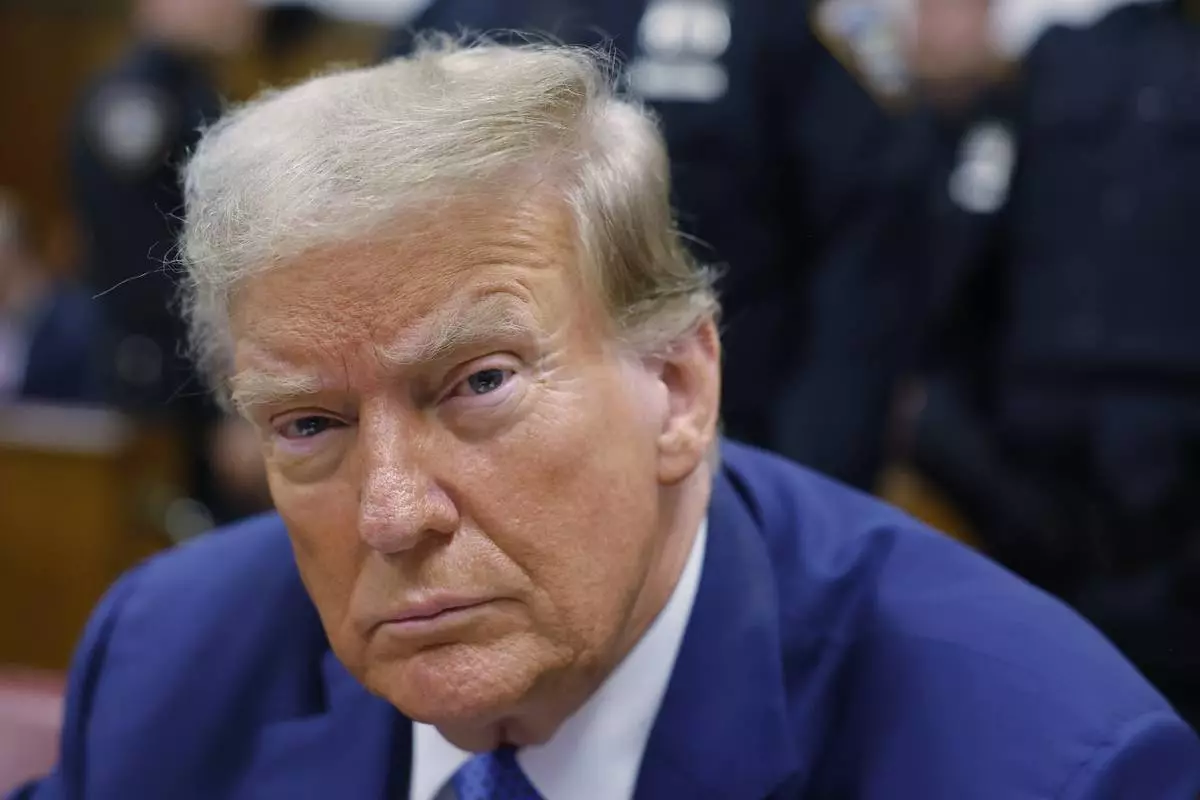
Former President Donald Trump appears at Manhattan Criminal Court on Monday, May 20, 2024 in New York. (Michael M. Santiago/Pool Photo via AP)
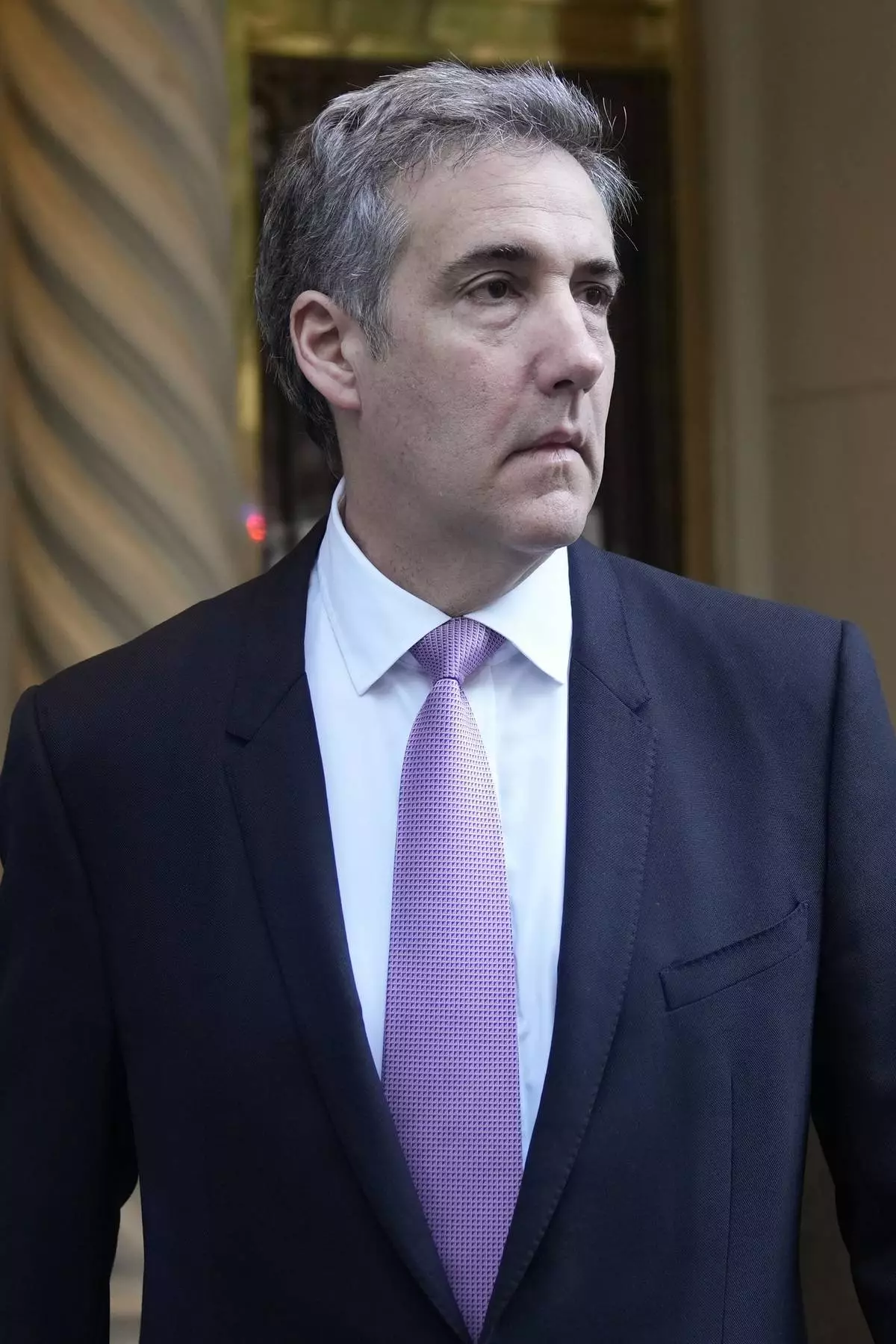
Michael Cohen leaves his apartment building on his way to Manhattan criminal court in New York, Monday, May 20, 2024. (AP Photo/Seth Wenig)

Michael Cohen leaves his apartment building on his way to Manhattan criminal court in New York, Monday, May 20, 2024. (AP Photo/Seth Wenig)
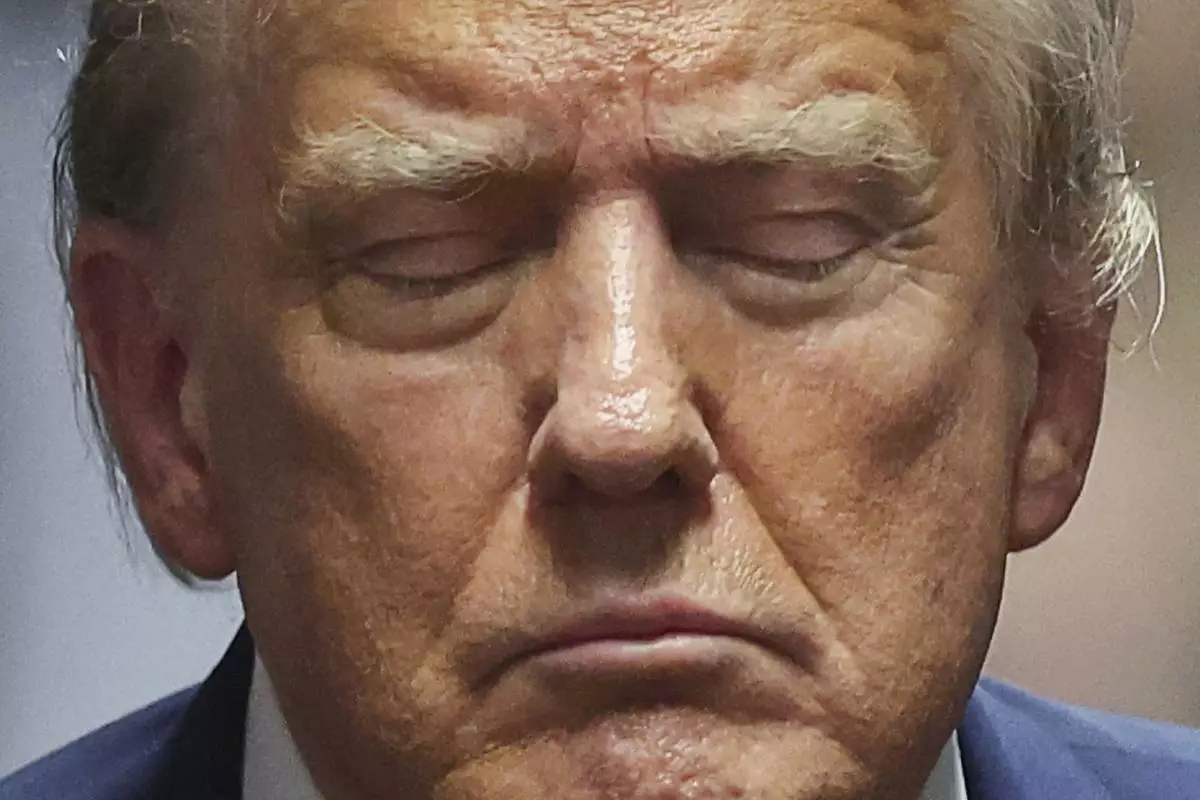
Former President Donald Trump closes his eyes, during his trial at Manhattan criminal court Thursday, May 16, 2024, in New York. (Mike Segar/Pool Photo via AP)
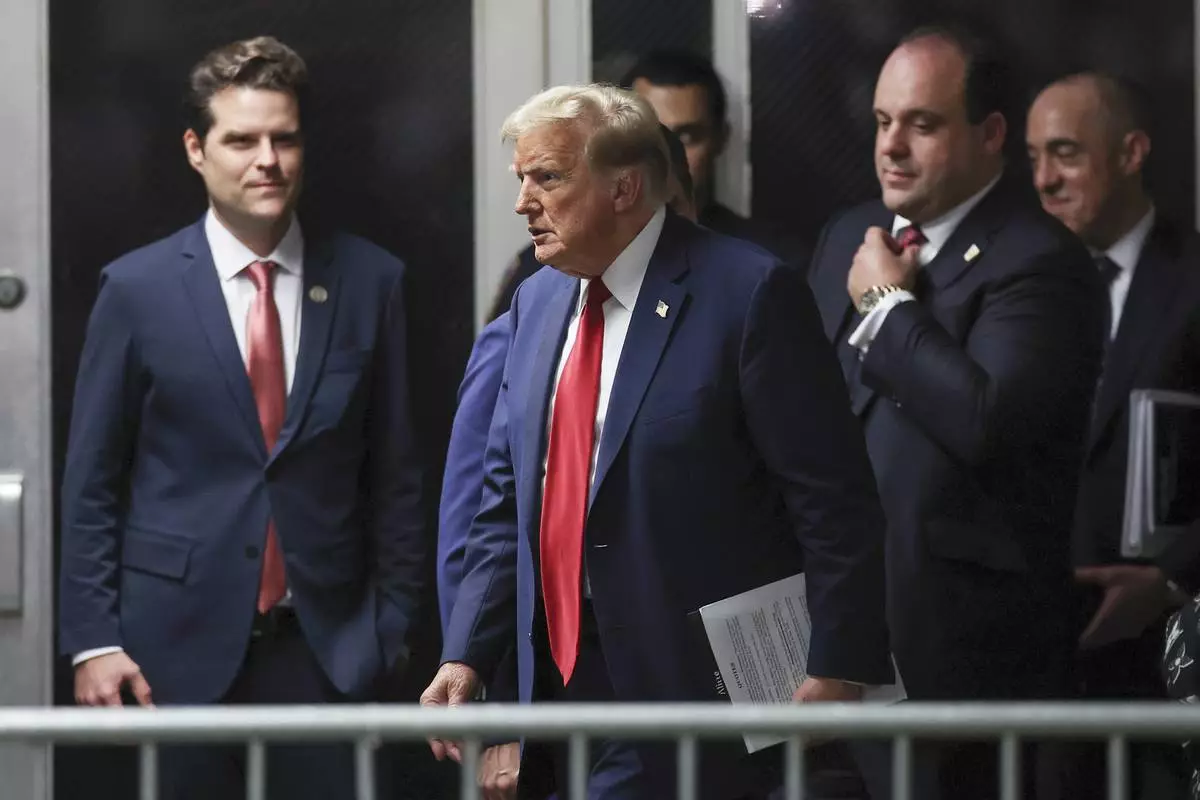
Former President Donald Trump, center, walks by Rep. Matt Gaetz, left, R-Fla., outside the courtroom after the day's proceedings in his trial Thursday, May 16, 2024, in New York. Trump's adviser Boris Epshteyn, and attorney Emil Bove, right, follow behind him. (Mike Segar/Pool Photo via AP)

FILE - Michael Cohen leaves his apartment building on his way to Manhattan criminal court, May 13, 2024, in New York. Donald Trump's hush money trial is heading into the final stretch. The landmark trial will kick back off Monday, May 20, in Manhattan with more defense cross-examination of former Trump attorney Cohen. Cohen's pivotal testimony directly tied Trump to the alleged hush money scheme. Defense lawyers are trying to paint Cohen as a serial fabulist who is on a revenge campaign against the presumptive Republican presidential nominee. (AP Photo/Julia Nikhinson, File)
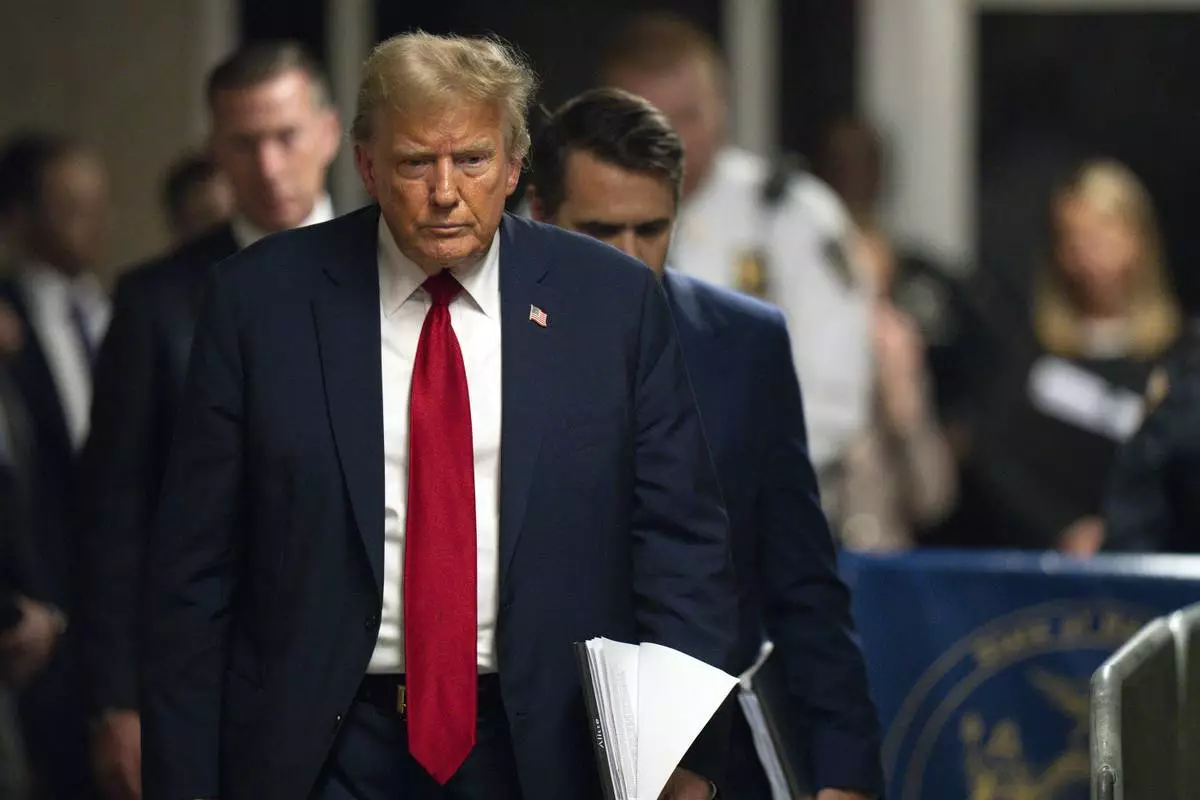
Former President Donald Trump walks over to addresses reporters following the day's proceedings in his trial at Manhattan criminal court in New York, Thursday, May 16, 2024. (Steven Hirsch/New York Post via AP, Pool)











